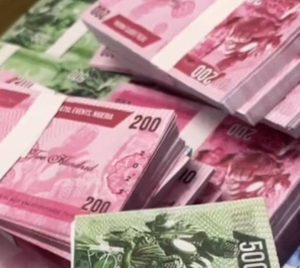 In light of increased scrutiny by the Economic and Financial Crimes Commission (EFCC) regarding the handling of Naira currency, Nigerians are finding new methods to uphold the cherished tradition of spraying money at social gatherings.
In light of increased scrutiny by the Economic and Financial Crimes Commission (EFCC) regarding the handling of Naira currency, Nigerians are finding new methods to uphold the cherished tradition of spraying money at social gatherings.
The recent high-profile cases involving individuals such as Bobrisky, a controversial cross-dresser, and actress Oluwadarasimi Omoseyin have brought attention to the severity of such offenses, leading people to seek alternative approaches.
Following Bobrisky’s conviction and the ongoing trial of socialite Pascal Okechukwu, also known as Cubana Chief Priest, a report outlining various actions involving the Naira that could have legal consequences. These actions include spraying, writing, tearing, stapling, dancing or stamping on the currency, selling it, mutilating it, rejecting it, and creating money bouquets.
The Central Bank of Nigeria’s Clean Notes Policy, implemented to enhance the visual appeal and durability of banknotes, emphasizes the importance of maintaining high-quality currency in circulation. This policy seeks to ensure that Naira banknotes are easily processed and accepted by the public.
To circumvent potential legal issues, partygoers and musicians have devised innovative alternatives for Naira spraying. Musicians, in particular, have expressed their support for the EFCC’s efforts to enforce the ban on currency abuse. While some believe this ban may affect musicians, especially those of indigenous genres, popular artists such as Wasiu Alabi (Pasuma), Saheed Osupa, and Adewale Ayuba have voiced their appreciation for the need to respect the country’s currency.
Here are some of the inventive methods employed by partygoers to partake in the money-spraying tradition at social functions:
Money Boxes: These boxes, frequently provided by celebrants or musicians, have become a permanent fixture at social gatherings. Attendees who prefer not to physically spray money can contribute by depositing their cash into these boxes as a gesture of honor or appreciation towards the celebrants or musicians.
Bank Transfers: Guests at weddings, burials, birthdays, and other events are now utilizing their banks’ mobile apps to transfer money directly to the celebrants while on the dance floor. This enables them to replace the traditional act of physically spraying money with a digital transaction.
Money Vouchers: Partygoers now have the option to purchase money vouchers equivalent to the amount they intend to “spray” and transfer the corresponding cash to event planners or agents. These vouchers often feature printed images of the celebrant or event host and are available in denominations of N1000 and N500 notes.
By adopting these alternative practices, individuals can continue to participate in the joyous tradition of celebrating with the Naira while respecting legal boundaries and the CBN’s Clean Notes Policy.

